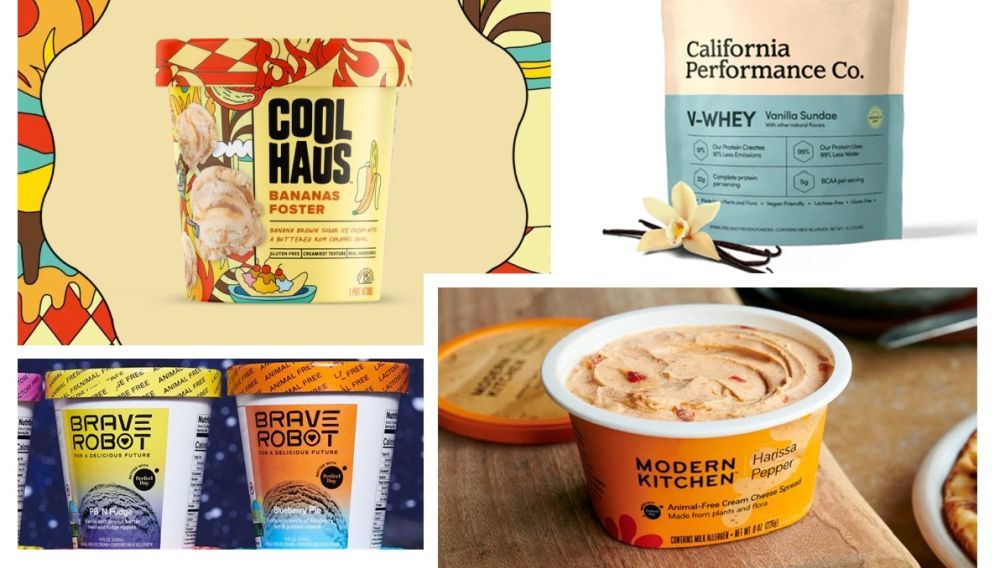The founders of precision fermentation specialist Perfect Day are stepping down from their leadership roles after a decade at the helm. The news comes as the company finalizes a pre-series E round of up to $90 million and installs current president TM Narayan as interim CEO.
The founders are not retaining board seats and are not sharing details of their financial position.
The Berkeley-based company is also teasing a launch—to be announced “within weeks”—with a leading CPG company that will be using its whey protein from fermentation, along with news about new molecules that it has been developing through its nth bio enterprise biology business.
Narayan, who joined Perfect Day in September 2021, will be supported by newly-appointed board co-chairs Aftab Mathur of Temasek and Patrick Zhang of Horizons Ventures, key backers of the startup, which is under pressure to deliver a return for investors who have pumped almost $840 million into the company to date.
An executive search for the CEO role (previously occupied by cofounder Ryan Pandya) has been initiated. However, AgFunderNews understands that Narayan, who has been driving the day-to-day operations of Perfect Day over the past year, will be a candidate in that search and is seen as a “natural fit” to run the company, which is now “on a clear path to profitability.”
The pre-series E was done in two parts, with the first part fully funded by existing investors; the company is finalizing additional capital from other investors now.

Evolving business model
Founded by Ryan Pandya and Perumal Gandhi in 2014 as ‘Muufri,’ Perfect Day initially planned to make ‘animal-free’ dairy milk containing a whey protein (beta-lactoglobulin) made by microbes instead of cows, but ultimately felt it could have a bigger impact by serving as a b2b supplier to the wider food industry.
While its core focus remained B2B, it created The Urgent Company in 2020 to stimulate market interest in animal-free dairy, building the consumer brands Brave Robot (ice cream), Modern Kitchen (cream cheese), and California Performance Co (sports nutrition). It went on to acquire ice cream brand Coolhaus in 2021 with a view to moving the products onto an animal-free platform.

Strategic pivot
In a strategic pivot revealed by AgFunderNews last year, however, Perfect Day sold its consumer brands to a new company called Superlatus for an undisclosed sum and laid off 15% of its workforce in a bid to focus on its B2B business as it forged deeper partnerships with large CPG companies.
The first products launched by multinationals utilizing Perfect Day’s whey protein include CO2COA animal-free dairy chocolate from Mars (now discontinued), Cowabunga animal-free beverages from Nestlé (tested in a handful of stores), and Bold Cultr animal-free cream cheese from General Mills (recently dropped). Starbucks has also tested animal-free milks but has not said anything publicly about their performance.
So what, if anything, does their success (or lack, thereof) tell us about the broader potential for dairy from microbial fermentation? And were these arguably niche propositions the best vehicles for testing the waters?
It makes sense that multinational partners would not risk their core brands in the first instance, Pandya told AgFunderNews in a recent interview. “These initial launches were designed as much to evaluate us as a potential supplier as to gain consumer insights. Can we hit quality requirements? Can we ship on time? Now that we’ve checked those boxes, we’re having a different kind of conversation.”
By moving away from ‘animal-free’ messaging to ‘whey protein from fermentation,‘ meanwhile, Perfect Day is now having more conversations with companies looking to reduce their carbon footprint and meet sustainability targets without necessarily going 100% animal-free, he said.
The economics of precision fermentation
To those querying the economics of precision fermentation to make dairy proteins, Pandya said: “We’re able to produce whey at a cost that was thought impossible 10 years ago, and we’re still only scratching the surface of what the biology is capable of.
“For precision fermentation more generally, the grams per liter that these organisms are making continues to be nowhere near the biological maximum, and then things like continuous processes will potentially help improve the economics even more.”
He added: “Our entire business model is predicated on [the basis that it’s commercially viable to make whey protein from fermentation] … and [based on improvements in titer, productivity and yield made in recent years] that’s why we have companies approaching us to work with nth bio [Perfect Day’s subsidiary enterprise biology business].
That said, right now, whey is certainly more economically viable than casein to produce via precision fermentation, he observed.
As for manufacturing, he said, work is progressing to build some production capacity inhouse: “We’re still working entirely with third parties, but we have a couple of different options that we’re evaluating to be able to get to that larger scale… to really unlock much larger capacity than is possible with contract manufacturers.”
What is animal-free dairy?
There is no formal definition of ‘animal-free’ dairy, a term deployed by some startups in the space, although Perfect Day now prefers ‘whey from fermentation.’ But it typically refers to products made with ‘real’ dairy ingredients such as whey and casein proteins that are produced without cows, either via genetically engineered microbes or genetically engineered crops such as soybeans, corn, or peas.
Using synthetic biology, firms in this space use DNA sequences like pieces of computer code to program or instruct plants or organisms such as fungi and yeast to express animal proteins.
Making dairy products without cows, argue animal-free dairy advocates, offers the best of both worlds: more sustainable and ethical products that don’t involve industrialized animal agriculture, but still deliver the nutrition and functionality of ‘real’ dairy such as melty, stretchy cheese, which is hard to make with plant proteins.
Perfect Day is the most advanced player in the field, producing whey protein from multiple sites that supply emerging CPG brands to large CPG companies. Other startups include Remilk and Imagindairy in Israel; Change Foods and New Culture in the US; All G Foods and Eden Brew in Australia; Formo in Germany; Those Vegan Cowboys in Belgium; Daisy Lab in New Zealand and so-called ‘molecular farming’ players such as Nobell Foods, Pigmentum, IngredientWerks, Mozza, and Miruku. [Disclosure: Nobell Foods is a portfolio company of AgFunder, parent company to AgFunderNews)
Watch our August 2023 interview with Perfect Day’s cofounder Ryan Pandya:





